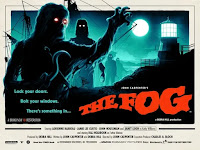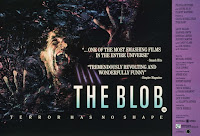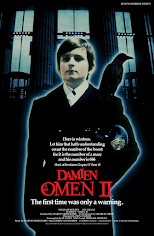As usual my brother and I watched a few family friendly films with our younger siblings throughout the month. In addition to Duel, the first two Quiet Place movies (which I've already written about) and A Nightmare Before Christmas (which has become mandatory seasonal viewing at this point) we also watched:
Corpse Bride (2005)
Of the three stop-motion films that Tim Burton has been involved with (he also wrote Nightmare Before Christmas and directed Frankenweenie) Corpse Bride is probably the most conventional in terms of plot. Like Nightmare it hearkens back to the old Rankin/Bass holiday specials. The German setting is reminiscent of Santa Claus Is Comin' to Town in particular. The story also owes a lot to gothic romances. As usual, the director puts his own unique stamp on the film with its macabre visuals and quirky sense of humor. Danny Elfman, with the help of John August, puts in a particularly strong score, filled with memorable songs and clever lyrics.
Score: 9/10
As always we watched Halloween this years, this time as a double feature with Halloween II, so some updated thoughts on that film are in order:
Halloween II (1980)
Halloween II is only sequel to feature significant contributions from the three artists most responsible from the success of the original film: John Carpenter and Debra Hill co-wrote the script again, and Carpenter also wrote a new score (with some help from frequent collaborator Alan Howarth). Perhaps most critically, Dean Cundey returned as the films cinematographer. His contribution cannot be underestimated. Not until the 2018 reboot (which apes his style more or less successfully) would the series be able to recapture the visual flair of the first two films (or three if you count the series misfit Season of the Witch). The result is the best Halloween sequel for whatever that's worth.
Score: 7/10
Django the Bastard (1969)
As I've been watching Spaghetti Westerns this year in preparation for next year's (tentatively) Westember III, I decided it would be a good time to check out this western/horror hybrid from Sergio Garrone. While not quite a horror film (the protagonist can never be the source of horror in a genuine horror movie) does contain a lot of creepy, sepulchre imagery. Then too, Django has an enigmatic quality that often accompanies horror movie villains (especially in slasher films): it is never made clear if he is mortal. Many spaghetti western heroes have a quasi-supernatural aura about them, but it is much more pronounced here. The film is a bit plodding at times, and that primitive/low budget quality which is so typical of this genre is both a help and a hindrance, but for the most part this is a really solid and unique entry in the genre.
Score: 8/10
Shocktober 2019 Ranked
1. The Sixth Sense (1999)
An absolute masterpiece.
2. The Thing (1982)
For pure, nail-biting suspense, very few horror films can match John Carpenter's The Thing.
3. The Fog (1980)
An underrated Carpenter film, I’ll always have a soft spot for the The Fog as my introduction to the genre.
4. The Innocents (1961)
A superb adaptation of the Henry James The Turn of the Screw.
5. Poltergeist (1982)
It’s a bit bonkers at times, but, for my money, Poltergeist is still the classic haunted house film.
6. I Married a Witch (1942)
I’m a sucker for old screwball comedies, and this is a really good one.
7. A Quiet Place Part II (2020)
Though not as strong as its predecessor, A Quiet Place Part II wisely keeps its focus on developing the characters and (less successfully) expanding the world of the first film.
8. The Curse of the Werewolf (1961)
A great, underappreciated werewolf picture. It may not have the groundbreaking special effects of its Universal counterpart, but it more then makes up for this with it’s sense of atmosphere and mounting terror.
9.
Duel (1971)
Speilberg’s first theatrical effort still holds up. Never was an rusty old truck more terrifying.
10. Corpse Bride (2005)
A strong stop-motion effort from Tim Burton.
11. Black Sunday (1960)
An impressive debut for Mario Bava.
12. Constantine (2005)
Not a great film by any means but I have a soft spot for anything that features Keanu Reeves killing demons with a cross-shaped machine gun that shoots bullets filled with holy water.
13. Dr. Jekyll and Mr. Hyde (1931)
A film of sharp contrasts, Dr. Jekyll is carried by a strong performance from Fredric March and surprisingly animated direction from Rouben Mamoulian.
14. The Omen (1976)
Richard Donner’s classic still holds up despite some (occasional) tonal inconsistency.
15. The Brides of Dracula (1960)
A rock solid sequel to the film that introduced Christopher Lee’s iconic take on the legendary nosferatu.
16. The Blob (1988)
A surprisingly fresh remake, the 1988 version of The Blob is much more dark and violent then the campy 60’s original.
17. The Conjuring: The Devil Made Me Do It (2021)
Though easily the least scary of the, now, three film series, The Devil Made Me Do It is still a strong entry and wisely keeps the focus on its characters.
18. Halloween II (1981)
Still the best of the many unnecessary Halloween sequels, though that’s not saying much.
19. The Shadow of the Cat (1961)
Erratic pacing mars what is otherwise a really unique, well directed horror film. Never was the sight of a cat so unsettling.
20. Django the Bastard (1969)
The films unique, sepulcher atmosphere is off-sett by its plodding pacing and occasionally sloppiness.
21. The Two Faces of Dr. Jekyll (1960)
This intriguing (and rather loose) adaptation of the Robert Louis Stevenson classic is held back (for me at least) by its (for the time) excessive raciness.
22. Captain Clegg (aka Night Creatures) (1962)
A fun, if fairly forgettable Hammer thriller.
23. The Man Who Could Cheat Death (1959)
An excellent piece of science-fiction horror in the Gothic vein of Hammer’s Frankenstein films, this film would probably be higher on the list if I hadn't seen so many good films this year.
24. Dead Snow: Red vs. Dead (2014)
An inventive horror film to be sure, but one that's a little too tasteless for my taste.
25. The Thing (2011)
Though a vastly inferior prequel, there are enough flashes of inspiration in The Thing to make me curious about the director’s original vision.
26. The Stranglers of Bombay (1960)
Though not a bad film by any means The Stranglers of Bombay is occasionally dull and the plot is rather contrived in places.
27. Color Out of Space (2019)
Though it effectively builds a sense of impending doom and madness, the Color Out of Space is too tonally inconsistent to really be effective.
28. Prince of Darkness (1987)
A lesser effort from Carpenter, though it does sustain a really eerie atmosphere, the plot is overly convoluted and the characters thinly drawn.
29. Damien: Omen II (1978)
The only truly terrible film we watched this time around, the second Omen film is a dreadful bore.
That about wraps it up for this year. Thanks for reading everyone!



















































